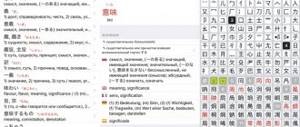The Japanese are one of the most courteous and polite nations. This has affected the language: there are several levels of addressing the interlocutor. One is applicable when interacting with a senior and superior in rank, the other - with a peer or friend, the third - with a junior or subordinate. When communicating with old acquaintances, the Japanese use simple figures of speech; when greeting strangers, they are polite and distant. To say “hello” in Japanese without offending your interlocutor, you need to know these nuances.
Politeness in communication is the main rule of the Japanese
"Hello" in Japanese
今日は - (kon-ni-chi-wa)
The simplest and most common greeting is konnichiwa. It is universal, suitable for most cases. Literal translation: good afternoon. Most appropriate between noon and 4 p.m.
To make the phrase sound polite, it is accompanied by non-verbal signs - bows, half-bows, hand gestures. Handshakes are a tradition that came to Japan in the mid-19th century and took root in business. In everyday life, Japanese people rarely shake hands as a greeting.
For a foreigner trying to say hello politely, correct pronunciation is not so important (the Japanese are lenient towards foreigners trying to master their language). It is much more important to accompany the remark with a non-verbal symbol - for example, bowing your head, showing respect for the interlocutor.
When meeting in the Land of the Rising Sun, they must bow or nod
Appeals related to the profession
Often, in Japanese official language, the name of a person is appended to the name of his profession. For example, instead of -san, -senshu (選手) is often added to the names of athletes. Within companies, his position is often added to the name of the interlocutor (president of the company - shatyou [社長], head of the department - butyou [部長]).
The names of professions have two variants: for example, “translator” - honyakuka (翻訳家) or honyakusha (翻訳者). Names ending in ka (家 – “house”) indicate knowledge, competence in a given field (the particle ka has the approximate meaning of “expert”), and, according to the rules of modesty and moderation accepted in Japan, are never used by the speaker in relation to himself.
The simple form of the name of the profession (ending in xia, 者 - “person”) is used in relation to oneself and in writing.
Honorifics associated with professions, such as sensei, have simple analogues: kyoshi (教師) - teacher, isya (医者) or isi (医師) - doctor, bengoshi (弁護士) - lawyer.
Polite options are used when talking about a person, simple ones - about his profession.
Appeals to criminals and crime suspects
Previously, convicted criminals were addressed without any additional titles. Nowadays hikoku (被告, “accused”) is used.
For example, Matsumoto-hikoku - Aum Shinrikyo.
Defendants awaiting trial are referred to as yougisha (容疑者 – “suspect”).
Although these “titles” were introduced for the purposes of political correctness, over time they acquire an increasingly negative connotation. Thus, after Goryo Inagaki was arrested due to a traffic accident in 2001, some media outlets used the new title メンバ (memba), derived from the English word member, avoiding the use of iyogisha.
Company names
In informal conversations, the company refers to other companies with the suffix -san. In business correspondence, if the letter is addressed to the name of the company and not to any specific representative, the address “onchuu” (御中) is used.
In addition, it is extremely important to indicate the type of company - publicly traded company (株式会社, kabushiki gaisha) is often shortened to one kanji 株 (kabu); private limited company (有限会社, yuugen gaisha), often shortened to the kanji 有 (yuu). The type of company is indicated in parentheses, before or after the name.
During business negotiations, hei-xia (弊社, literally “small, small, insignificant company”) is used to mean “our company”; instead of “your company” - ki-xia (貴社) in writing and he-xia (御社) in speech (both literally mean “respected, honored, glorious, honorable company”).
hei-xia and he-xia can be replaced by the more neutral tou-xia (当社, “this company”) or ji-xia (自社, “my company”).
For organizations providing professional services (for example, in industries such as law, accounting, accounting), xia is often replaced by jimusho (事務所, “office”).
Dono, tono
Dono and tono (both written 殿) roughly mean “lord” or “master.” They are no longer used in everyday communication, but are sometimes used in business correspondence, certificates, awards, and written invitations to tea ceremonies. The word dono originally referred to the residence of the aristocracy and its approximate meaning now is a representative of high society, an aristocrat. Dono is close in meaning to sama, but is less formal and often carries a connotation of affection and love for the interlocutor.
Dono and tono are often used in anime and manga drafts to describe two types of characters: the humble servant's address to his master, the lord (to express less respect than sama, but more than -san) and to address, with greater respect, a strong or important character to an equally strong interlocutor.
Ue
The address ue (上, “above”) expresses a high level of respect for the interlocutor. Rarely used in ordinary speech, it is included in established expressions: chichi-ue (父上) and haha-ue (母上) - a respectful mention of someone's parents, including one's own. When used, it does not require a name and is often used in conjunction with ue-sama.
Titles of statesmen
Heika (陛下, “His Majesty”) – added to the title of the reigning person. Examples: Tennou heika (天皇陛下) – “His Majesty the Emperor”, Kougou heika (皇后陛下) – “Her Majesty the Empress”, Kokuou heika (国王陛下) “His Majesty the King”, Joou heika (女王陛下) – “Her Majesty Queen". The word heika (“Your Majesty”) is used when addressing the reigning person directly;
Denka (殿下, "Royal Highness" or "Majesty") - added to the title of a non-reigning member of the royal family. For example, Suve-den Oukoku, Vikutoriya Kyotaishi denka (スウェーデン王国,ヴィクトリア皇太子殿下) – “Her Royal Highness Crown Princess Victoria of the Kingdom of Sweden”;
Kakka (閣下, “Your Excellency”) – used when addressing ambassadors and heads of foreign states;
Hidenka (妃殿下) - used to respectfully address the prince's wife;
Shushou (首相) – Prime Minister of Japan;
"Good morning" in Japanese
おはようございます – (Ohayōgozaimasu)
Any phrasebook begins with greeting phrases that depend on the time of day. Daytime and universal option – konnichiwa; but he's not the only one.
Ohaiyo gozaimas is the most polite version of the morning greeting. When communicating with a loved one, they use only the first part of the replica, omitting the verb gozaimas, symbolizing a respectful attitude. The “Good morning” response is appropriate in the first half of the day.
Ohaiyo - morning greeting in the Land of the Rising Sun
"Hey dude" in Japanese
Informal communication is typical for young people. The informal Japanese greeting "Yahoo" is common. It appeared in the Osaka dialect and gradually spread throughout the country. This word is universal, but is used more by girls. Guys prefer the shortened version "Yo".
Some slang phrases are used only by guys, others only by girls
Other requests
教師, きょうし (kyōshi): used to address the instructor outside the gym, in everyday speech instead of sensei; 親方, おやかた (oyakata): trainer (usually in sumo); 師範, しはん (shihan): head coach; 指導員, しどういん (shido:in): ordinary trainer; 師匠, ししょう (shisho): another appeal to martial arts teachers; 関 (“barrier, obstacle, obstacle”), ぜき (zeki): sumo wrestlers performing in the two highest weight categories (sekitori); 法師, ほうし (ho:shi): Buddhist monk;
Hongke
Honke (本家) - a very honorable address for the eldest son in the family, is now almost never used. Never used in relation to oneself, since such use is considered a sign of pride.
Euphonic suffixes
In informal communication, some Japanese come up with new suffixes, harmonious or forming certain combinations with the name, to express their attitude towards the interlocutor.
For example, nobaka (has both positive and negative connotations), bii (disdainful, mocking) and rin (friendly).
Variations of -chan are also common: ちん (chin), たん (tan), and ちゃま (chama).
Tin and tan are incorrect pronunciations that are characteristic of children and are perceived as children's speech.
Tin is considered unattractive to the ear and is used (as a rule, to a younger interlocutor) in relation to unpleasant, socially dangerous, mentally unstable people, in order to only formally observe etiquette.
Tan (sometimes chan) is used among otaku with the names of popular anime, manga or video game characters, memetic cartoon girls, as well as all popularized inanimate objects, concepts, phenomena and consumer products.
Examples: OS-tan (drawn girls representing operating systems) and Bisuke-tan (biscuit).
Some of these characters are company mascots.
Tyama is a hybrid word made up of the parts chan and sama, used to refer to a younger interlocutor who deserves more respect than is due by age.
Source: nippon.temerov.org The site is dedicated to learning the Japanese language
✈️ Travel services
Informal greetings in Japanese
Modern Russian-Japanese dictionaries list variants of informal, friendly slang:
- Oss is rude male slang, appropriate in communication between peers who are in a trusting relationship. Translated as “Great!”, “Hello!”. おっす – (Ossu)
- Uyss is an expression common only among girls. Derived from "Ohaiyo gozaimas".
- Hai! - a word that came from the English language.
- Hi hi! – comes from English.
- Cum! – “Priva!”, short for “Konnichiwa.”
Friendly slang is popular among young people
"Hello! Long time no see" in Japanese
久しぶり- (Hisashiburi)
Speaking politely in Japanese is not difficult if you use clichés for the situation. When greeting a friend after a long separation, they use the phrase “Ohishashiburi des ne.” During a short pause between meetings, you can say “Shibaraku deshta.” If the separation lasted for years, the expression “Nan nen buri deshita ka”, literally translated as “How many years have passed?!” would be more appropriate.
When meeting a friend or relative, you can greet him with a shortened version of “Hisashiburi!”
Greetings after separation – Ohishashiburi
"How are you?" in Japanese
最近どう – (Saikin dō)
“How are you” is a universal phrase for small talk (short polite conversation) in any language, so time is devoted to it in the first lesson. A common polite Japanese form is "O genki de ka." When communicating with family, friends or colleagues of the same level, they use the wording “Saikin dou”. She is not so official, not so strict.
More options:
- Genki - informally, abbreviated.
- Choushi wa dou de ka – more formally.
- Doushite imas ka - politely, not too formally.
Having heard such a question addressed to you from your interlocutor, you can answer:
- Genki des - Everything is fine.
- O-kage sama de - Thank you, good thanks to you.
- Ai Kawarazu – Thank you, no change.
- Maa maa des ne - So-so.
Genki - an informal version of the question “How are you?”
Cafes and shops
How much does it cost? Kore wa o-ikura des ka? Can I pay with a credit card? Kureditto ka:do de haratte mo ii des ka?When will the dry cleaning be ready?Kuri:ningu wa itsu dekimasu ka?Is this watch made in Japan?Sono tokei wa nihonsei desu ka?Where can I buy?Wa doko de kaemaska?Do you have it?Arimaska?Show me this please Sore o misete kudasaiCan I try this on?Kite mite mo ii deska?Women's clothingFujin fukuMen's clothingShinshi fukuProductsSyokuryo: hinPlease tell me , where is the shopping center (neighbourhood)? Sumimasen ga, sho: tengai-wa doko des-ka? I need to buy milk and bread Is there a grocery store nearby? Pan to po: nu: -o kaitai, no des ga, kono hen-ni shokuryo: hinten-ga arimasen-ka How much do I charge for everything? Dzembu-de ikura-ni naru, but des-ka? Please give me a check Tekku-o-negai shimas I want to see the camera (video camera) Camera-o mitai, but des gaTwo coffees please Ko:hi:futatsu o-negai ShimasuNo. I'm already full. Thanks for the treat. Mo: ippai desu. Gothiso: sama deshita Is this cake delicious? No. Not very tasty Sono ke:ki wa oishi desu ka? Eee. amari oishiku nai desuOh, how delicious it was! Aah, oishikatta! Waiter! Chotto, sumimasen Menu, please Menu: kudasai What would you recommend? About susume wa nandeska? How do they eat it? Kore o do: yatte tabemaska? Japanese dishes Washoku Western dishes Yo: cheek Beef Gyu: niku Pork B utanikuChicken TorinikuFishSakanaPotatoesPote : toRiceGohanBreadPanSaladSaradaSoup: puVegetablesYasaiFruitKudamonoDessertKudamonoSaltShchioSugarSatoSoy sauceShyoyuCoffee (hot)Hotto ko: hiCoffee (iced)Aisu ko: hiBlack teaKo: chaGreen teaO: chaWine (red)AkauainWine (white)Sh Irouine Rice vodka Sake Thank you, I don't drink Do: mo arigato, watakushi-wa nomasen Please, please coffee and scrambled eggsKo:hi:to tamago no medamayaki-o-negai shimas"Good evening" in Japanese
こんばんは – (Konbanwa)
Both Russian and Japanese have a special phrase for greeting an acquaintance in the evening. Sounds like "Konbanwa". Residents of the Land of the Rising Sun use it after 16 hours. The phrase is respectful, appropriate in communication with equals and elders.
When meeting after 4 pm, the Japanese greet each other with the remark "Konbanwa"
"Good night, good night" in Japanese
おやすみ – (oyasumi) お休みなさい – (Oyasumi nasai)
To politely say “good night,” the phrase “Oyasuminasai” is used. It is applicable as a farewell when parting after sunset. Sometimes they say hello with it if the meeting took place in the dark.
When communicating informally, they shorten the remark to “Oyasumi.”
Oyasumi - an informal version of the evening farewell
Greeting by phone
say “ moshi moshi instead of the usual “ hello . You should also answer “moshi moshi” or “power power.”
Basic moments:
- When meeting in person, DO NOT say “moshi moshi”
- You can use it at any time of the day, but only by phone
- This greeting is written in Hiragana characters like this: もしもし
- Pronounced “mosi mosi” more often as: “mosh mosh”
Handshake
Shaking hands is not customary among the Japanese. This gesture is appropriate when communicating with foreigners. Residents of the Land of the Rising Sun use bows, half-bows, and nods among themselves. Sometimes young people shake hands when they meet. Now this gesture is more common than a century ago, but it is still not widespread because it does not fit with traditions and the idea of the appropriateness of touching another person in public.
Handshakes are a European tradition that appeared in Japan in the 19th century.










